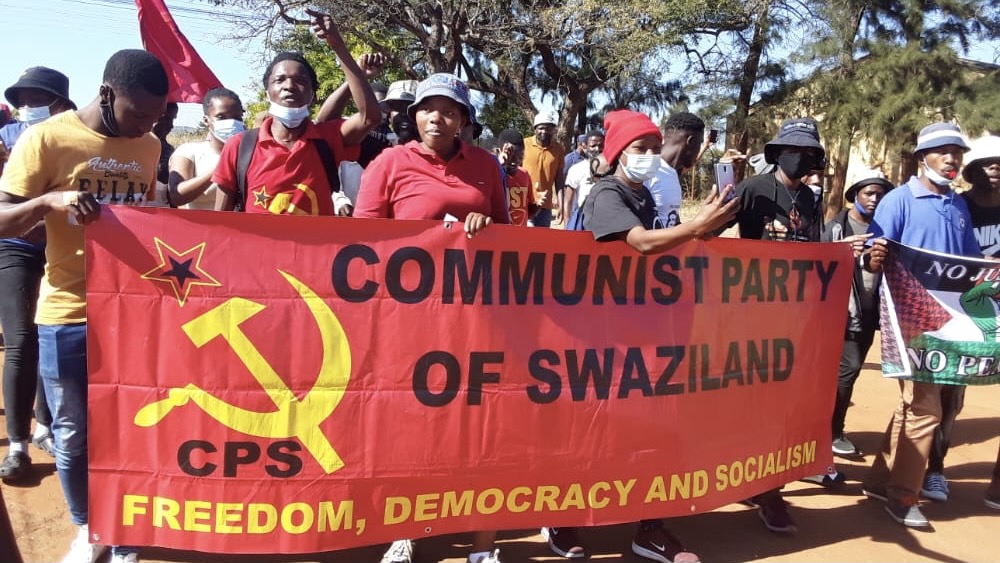Army soldiers kidnapped two children of a National Organizer of the Communist Party of Swaziland (CPS), Ayanda Ndwandwe, on Sunday, March 21. About 40 soldiers, “armed-to-teeth” and driving four armored vehicles, “invaded his home” in the rural area of Lubulini in the Lubombo Region at around 3 pm, the banned party said in a statement.
The party believes that the contingent of soldiers had most likely come to Ndwandwe’s home with the intent to arrest him. When they did not find him at home, they instead abducted his cousin, a 23-year-old woman, along with his two children, who are three and five years old. They were held in custody for several hours before being released later in the day, Manqoba Motsa, a Central Committee (CC) member of the CPS, told Peoples Dispatch.
“Comrade Ayanda was critical in helping the rural community in the region organize themselves for their welfare and security. He also had an important role to play outside of his region as a member of the party’s National Organizing Committee,” he said.
After this incident, Ndwandwe, along with other local cadres of the party who had been attacked by security forces in the area a day earlier, have been forced to go underground.
CPS has been organizing “Sunset Rallies” around Swaziland (renamed Estawini) to reiterate that the reign of King Mswati III, the last absolute monarch in Africa, is now in its evening, nearing its end, Motsa said, explaining the symbolism.
On the evening of March 19, rallies were held in the regions of Manzini, Mbabane, Limpopo and in Lubombo. In the Lubulini area of Lubombo, security forces, including the army and the police, fired tear gas to disperse the small rally there that was being led by Ndwandwe.
“One live bullet was also fired. Many comrades were injured while escaping,” Motsa said. Even before the rally had begun, heavily armed police, outnumbering the rally itself, had arrived on the scene and set up barricades along the route of the planned rally, he added. The evening before, on March 18, several activists on the way from Manzini to join this rally had been detained in the Big Bend region.
While cycles of protests against the monarchy and repression by its security forces have been repeating over the last decades, these were mostly limited to urban areas such as Manzini and Mbabane. The well-organized student organizations and trade unions – especially of the civil servants, including doctors, teachers and staff in government offices – have been at the forefront of this long struggle for democracy.
However, last year, the struggle for democracy rose to a new level with anti-monarchist demonstrations sweeping across the rural areas and rallies organized in every single constituency across the country. When violence was unleashed against these peaceful rallies, an uprising erupted in the urban industrial centers, with attacks on businesses and properties owned by the King and his associates.
In the midst of this uprising in late-June and early-July of 2021, the king had briefly fled the country while the army put down the uprising by killing at least 70 and wounding hundreds. However, pro-democracy protests and armed repression have continued, especially on the trade union and student front.
The security forces appear to be especially concerned about political activities in rural areas, which until the country-wide protests last year, were perceived to be largely loyal to the King. Community organizers such as Ayanda Ndwandwe, who play a key role in politicizing rural areas, are perceived as a major threat.
A clear example of this fear felt by the security forces is that on March 20, armed police intervened in Lomahasha constituency in Lubombo region to stop residents who were only fixing accident-causing potholes on a road, using picks and shovels.
The perceptible paranoia of the Mswati’s security establishment that any collective action by people could trigger off another anti-monarchist upheaval is not entirely misplaced. “Democracy Now!”, which had long been a slogan of the Communist Party, has become a national cry in Swaziland.





